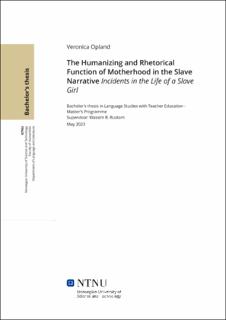| dc.contributor.advisor | Rustom, Wassim, R. | |
| dc.contributor.author | Opland, Veronica. | |
| dc.date.accessioned | 2023-07-04T17:20:39Z | |
| dc.date.available | 2023-07-04T17:20:39Z | |
| dc.date.issued | 2023 | |
| dc.identifier | no.ntnu:inspera:142538699:69781832 | |
| dc.identifier.uri | https://hdl.handle.net/11250/3075819 | |
| dc.description.abstract | Denne bacheloroppgaven argumenterer for at Harriet Jacobs' selvbiografiske slavefortelling Incidents in the Life of a Slave Girl trosser slaveriets materialistiske logikk om menneskelig eierskap gjennom sin humaniserende skildring av morsrollen. I fortellingen fletter Jacobs inn sine dypt humaniserende morsfølelser, ikke bare for sine egne barn, men også for resten av slavesamfunnet. Forholdet mellom slavemoren og barnet hennes er sentralt for å underbygge slavinnenes morsfølelse. Videre opplevde slavinnene en følelse av autonomi ved å ta valg (selv om de var sterkt begrenset) i forbindelse med svangerskapet, noe som viser deres lengsel etter menneskelig handlekraft. Gjennom Jacobs' refleksjoner får vi også innblikk i slavekvinnenes kulturelle forståelse av kjønn og internalisering av dyd. De kvinnelige slavene ble nektet muligheten til å leve opp til den idealiserte moderskapsmodellen, og skapte i stedet en utvidet forestilling om moderskap gjennom kollektiv barneoppdragelse. Deres evne til å knytte ikke-biologiske morsbånd demonstrerer slavekvinnenes dypt humaniserende natur. | |
| dc.description.abstract | This bachelor thesis argues that Harriet Jacobs’ autobiographical slave narrative Incidents in the Life of a Slave Girl defies slavery’s materialistic logic of human ownership through its humanizing portrayal of motherhood. In the narrative Jacobs weaves in the deeply humanizing maternal feelings she possesses not only limited to her own children, but for the rest of the slave community. The relation between the slave mother and her child is central for the substantiation of slave women’s maternal sentiments. Furthermore, slave women reclaimed a sense of autonomy through making choices (although severely limited) about their pregnancies, which showcases their longing for human agency. Through Jacobs’ reflections, we also learn of slave women’s cultural understanding of gender and internalizations of virtue. Denied the chance of the idealized model of motherhood, female slaves instead created an expanded notion of motherhood with a collective upbringing of children. Their capacity to form non-biological maternal bonds demonstrate the deeply humanizing nature of slave women. | |
| dc.language | eng | |
| dc.publisher | NTNU | |
| dc.title | The Humanizing and Rhetorical Function of Motherhood in the Slave Narrative Incidents in the Life of a Slave Girl | |
| dc.type | Bachelor thesis | |
